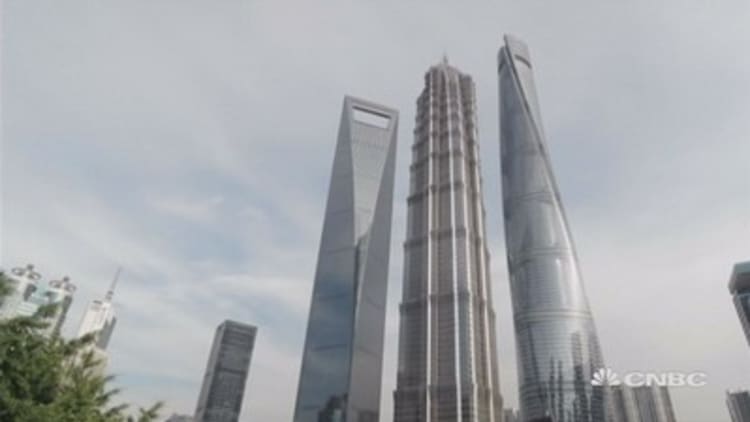
SHANGHAI, China — Noisy, grinding machinery and traffic snarled around dusty construction sites. These are common sights and sounds in China, as the world's second-largest economy builds rapidly into the sky.
China has constructed more skyscrapers than any other country every year for nearly a decade, according to the Council of Tall Buildings and Urban Habitat. And the most iconic edifice in these transformed skylines is Shanghai Tower, a shiny column that spirals 128 floors and 632 meters into the clouds, making it China's tallest building, and the world's second-highest.
It's got plenty of bells and whistles, boasts the world's fastest elevators, a stunning observatory deck, and even notched top marks for green building by industry groups in the U.S. and China.
But Shanghai Tower reflects wider woes in China's commercial property market, as it has struggled to attract tenants since the last beam was placed on top three years ago. Experts say the challenge is that companies looking to cut costs amid a wider growth slowdown are now spoiled for choice.
"With more and more skyscrapers in Shanghai, in cities [in China], the vacancy will remain very high for some time," said Anny Zhang, head of Shanghai office leasing for Jones Lang LaSalle, one of the agents for Shanghai Tower.
The vacancy rates for prime office space in Shanghai spiked to 12 percent in the first quarter, according to JLL. And troubles in top tier cities, which attract a wide range of companies, could be compounded in smaller cities.
Entire floors of Shanghai Tower continue to sit empty, contributing to city vacancies. Part of the issue was due to a delay in obtaining fire safety permits, which only came through a few months ago. But a planned luxury hotel has yet to open and hallways remain deserted.
About 60 percent of the office space has now been leased out, but only one-third of those tenants have moved in, said JLL. Major tenants include Alibaba and All Bright Law Firm, according to CBRE, the other leasing agent for Shanghai Tower.
Still, "it is an iconic building," said Andrew Nicholson, head of asset services in Asia Pacific for CBRE.
"When you land at Pudong Airport … you see Shanghai Tower rising out," he said. "Like any building, you seek not to market just the office space — you market a community, you market an environment."
And that's exactly what attracted All Bright Law Firm, said Chen Guang, a senior lawyer at the firm.
"The building is unique in China, and it suits our firm's image, as we are a leader in the legal profession," Chen said. "This is also what the Shanghai Justice Bureau hopes — for a signature Shanghai law firm to enter Shanghai Tower."
Despite the issues that China's tallest building has faced, both JLL and CBRE say they remain confident that the market will pick up in the long run.
For instance, there are government programs and policies that will continue to draw companies to certain areas, like free trade or special economic zones, as they have to be there to take advantage of tax breaks or special programs.
Demand is also coming from smaller companies looking to upgrade to better space, Zhang said. And a recent trend JLL has observed, she said, is large firms seeking to move to buildings in the outskirts of town for lower rents, especially if they're near metro lines, where office complexes have a variety of supporting facilities like malls, gyms and apartments.
Although in Shanghai, there "won't be a huge earthquake in the commercial market and rents will stay flat for a short time — six to 12 months — we forecast it will start to pick up," Zhang said. But in other smaller cities facing challenges, landlords will have to consider adjusting the asking rents.
For now, though, Shanghai Tower has managed to attract some of the city's highest rents ever given its iconic status, according to JLL.
The skyscraper is also an example of new trends in the market, Nicholson said.
China, he said, is now "taking a deliberate and proactive approach to how you integrate green buildings and how you create a green ideology from the first bricks laid on the ground through to occupation."
When it comes to retail space in these skyscrapers, much of it is trending toward more food and beverage options, and giving customers a better retail experience, he said.
And while Shanghai Tower is a relatively new addition to the skyline, it's been welcomed by city residents.
"It's a landmark building and very modern," said Wang Bin, a Shanghai resident who works in the neighborhood. "It looks like a dragon hovering up to the sky."
—CNBC's Barry Huang contributed to this report.


